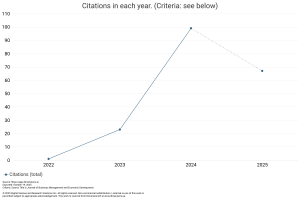The Relationship between Career Selection and Career Satisfaction
DOI:
https://doi.org/10.59653/jbmed.v2i03.851Keywords:
Career, Career Selection, Career Satisfaction, Career Choices, Individual’s Career Development, Personal CharacteristicsAbstract
Career selection and career satisfaction are integral factors that influence an individual's professional development and happiness. This study examines the complex, reciprocal relationship between these two concepts through a review of relevant literature. Career choice involves determining one's future career based on interests, abilities, values, and goals. Proper career selection positively impacts career satisfaction when there is alignment between the individual and their work. Conversely, dissatisfaction with one's chosen path may precipitate career changes. Career satisfaction relates to subjective well-being and success derived from work experiences and achievement of career goals. High satisfaction promotes motivation and productivity, while low satisfaction reduces commitment and performance. Personal characteristics, educational background, socioeconomic factors, and the social environment also shape career choice and satisfaction levels over time. Compatibility between career and individual personality traits or values typically enhances outcomes. Work environment quality, development opportunities, and work-life balance further mediate this relationship. A supportive culture, continuous training, and balanced responsibilities impact job fulfillment. Informed career selection centered on self-awareness establishes foundations for satisfaction and success. However, satisfaction likewise influences persistence or diversification from initial choices. Understanding this complex, mutual relationship optimizes career trajectories and organizational effectiveness.
Downloads
References
Akıncı, Z. (2002) Turizm Sektöründe İşgören İş Tatminini Etkileyen Faktörler: Beş Yıldızlı
Aytaç, S. (2001) ‘’Kişilik ve Meslek Seçimi Arasındaki İlşki ve Bir Uygulama’’. Bursa.
Aytekin, A. (2005) Meslek Seçimini Etkileyen Sosyoekonomik ve Kültürel Faktörler: Isparta
Bekleviş, F. Öğrencilerin Mesleki İlgi Alanları ve Ailenin Meslek Seçimine Etkisi (Bolu İli Özel Dershanelerde Üniversiteye Hazırlık Kursu Gören Öğrenciler Üzerinde Bir Araştırma). Bolu.
Colakoglu, S. N. (2011). The Impact of Career Boundarylessness on Subjective Career Success: The Role of Career Competencies, Career Autonomy, and Career Insecurity. Journal of Vocational Behavior, 79(1), 47-59.
Doğan, C. (2005), “Türkiye ve Kazakistan’da Öğretmen Adaylarının Meslek Tercihi ve Öğretmenlik Mesleğine İlişkin Düşünceleri”, Bilig, Sayı: 33, 1-22.
Erdoğan, Z. (2008) Bireyden Profesyonele: Kariyere İlk Adım. 1. Baskı, Ankara: Ekin Yayınları.
Ghazi, S.R., Shahzad, S., Shahzada, G., Gillani, U.Z., (2011) “Job Satisfaction of Head Teachers for the Selected Twenty Dimensions of Job”, International Journal of Academic Research, Vol. 3. No. 1., 651-654.
Karatepe, O. M. (2012). Perceived Organizational Support, Career Satisfaction, and Performance Outcomes: A Study of Hotel Employees in Cameroon. International Journal of Contemporary Hospitality Management, 24(5), 735-752.
Kasatura, İ. Kişilik ve Öz Güven. Evrim Yayınevi. İstanbul, 1998.
Kong, H., Cheung, C. ve Song, H. (2012). From Hotel Career Management to Employees’ Career Satisfaction: The Mediating Effect of Career Competency. International Journal of Hospitality Management, 31(1), 76-85.
Köknel, Ö. (1993) “Zorlanan İnsan”. İstanbul: Altın Kitaplar.
KUZGUN, Y. ‘Meslek Danışmanlığı’’. Nobel Yayın Dağıtım, Ankara.2000.
Ohiwerei, F.O., Nwosu, B.O. (2009) “Vocational Choices among Secondary School Students: Issues and Strategies in Nigeria”, Asian Journal of Business Management, 1(1): 1-5.
Özkoç, H.H., Marangoz, M. ve Aydın, A.E. (2018). ‘’Öğrencilerin kariyer alternatiflerini etkileyen faktörler ve girişimcilik eğitimi’’. Uluslararası İktisadi ve İdari Bilimler Dergisi, 4 (1), 98-119.
Pekkaya, M. ve Çolak, N. (2013). ‘’Üniversite öğrencilerinin meslek seçimini etkileyen faktörlerin önem derecelerinin AHP ile belirlenmesi’’. International Journal of Social Science, 6(2), 797‐818.
Sarıkaya, T. ve Khorshid, L. (2009). ‘’Üniversite öğrencilerinin meslek seçimini etkileyen etmenlerin incelenmesi: Üniversite öğrencilerinin meslek seçimi’’. Türk Eğitim Bilimleri Dergisi, 7(2), 393-423.
Su, R., Murdock, C. ve Rounds, J. (2015). Person-Environment Fit. P. J. Hartung, M. L. Savickas, ve W. B. Walsh (Eds.), APA Handbooks in Psychology. APA Handbook of Career Intervention, Vol. 1. Foundations içinde (ss. 81–98). Washington, DC: American Psychological Association.
Yelboğa, A. (2008) “İnsan Kaynakları Bölümünde Çalışanların İş Doyumlarındaki Farklılıkların İncelenmesi”. Yönetim, Yıl: 19, Sayı: 61, 125-142.
Downloads
Published
How to Cite
Issue
Section
License
Copyright (c) 2024 Belal Dahiam Saif Ghaleb

This work is licensed under a Creative Commons Attribution-ShareAlike 4.0 International License.
Authors who publish with this journal agree to the following terms:
- Authors retain copyright and grant the journal right of first publication with the work simultaneously licensed under a Creative Commons Attribution-ShareAlike that allows others to share the work with an acknowledgement of the work's authorship and initial publication in this journal.
- Authors are able to enter into separate, additional contractual arrangements for the non-exclusive distribution of the journal's published version of the work (e.g., post it to an institutional repository or publish it in a book), with an acknowledgement of its initial publication in this journal.
- Authors are permitted and encouraged to post their work online (e.g., in institutional repositories or on their website) prior to and during the submission process, as it can lead to productive exchanges, as well as earlier and greater citation of published work (See The Effect of Open Access).





























